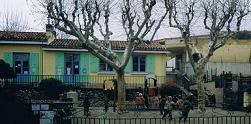
"Siberia 2007" story # 9
MARCEL PAGNOL
St. Florent, France
March 28, 2007
I resolved I would leave Corsica on a Tuesday, nine days after coming to the island. There was something I wanted to do on Monday, though, something I wanted to do before I left France, and that was to read a book by Marcel Pagnol.
Many French people had recommended reading one of his books.
Heīs from the region called Provence. The heart of Provence is a hilly but mountain-less, land-locked area with no major cities, a rather unspectacular place. Iīd read a book called, "Contes Tradicionelles du Provence" (Folkloric Tales of Provence). It told of girls kissing giant, man-eating lizards and turning them into princes, for example. It seems Provence makes up for its unspectacular land with a rich tradition, superstition, and a fairy-tale imagination.
Pagnolīs book, "Manon des Sources" (Manon of the Fountains), took place in a countryside village of 146 people in Provence. It detailed the fountains, the flowers, the plants, the herbs, and the hills of the region. The subjects of the story were bland ones, yet its with such subjects that the French language shines.
Pagnolīs depiction of the village characters was funny. The title character, Manon, was a beautiful but shy, blond-haired, fifteen-year-old shepherdess who lived in the hills and ran or hid whenever she saw someone. Her dead father had been a hunchback who was totally impudent as an entrepeneurial agriculturist. One ex-friend of the fatherīs exclaimed, angrily, "(translated) You couldīve listened to my advice, but, instead, your daughter is running around the countryside like a grasshopper!"
The best scene came at a village meeting. The "source" which had provided the village with water for as long as anyone could remember had mysteriously and tragically stopped running. A geologist came to the area to assess the problem. The mayor, who didnīt like giving his people bad news, had the geologist read his long, scientific report at the meeting.
The worried villagers "Ooh!"ed and "Aah!"ed from their seats. At times, strings of totally incomprehensible terms gushed at them, and they hesitantly responded with happy sighs or angry shouts, often incorrectly judging the words by their neighborsī reactions. The old attendees distrusted the university-taught young geologist, and one proclaimed that all science and technology was lazy and worthless.
The report intelligently gave four possible scenarios for how the fountain had stopped, and when the villagers didnīt like what they implied, they called for, More Scenarios! In the end, they half-blamed the geologist for their water woes, and he barely got out of the village safely. Pagnolīs created world was fairy-tale-esque and romantic and wonderful.
...
My experimental world on Corsica didnīt yield definitive results. The all-unpackaged-foods diet survived a week, but, on the eighth night, I woke before sunrise, too hungry to sleep, and opened a container of chocolate spread for bread. Low-quality, unpackaged food fills me up better.
But, Corsica WAS a good, natural place for meditation. On my last day, a storm pushed me from living in my tent, up the rocky hill a bit to a small, stone house with a protected inside. It was my castle.
The sunset was a dark, exploding cloud lost in light-orange over St. Florentīs mountains. The mountains and I swelled around the bay like a horseshoe of mighty brothers. Wind blew the waterīs surface into waves that spun around like synchronized swimmers. Wind swept past the stone house, in one unwaning, ten-second blust that wouldīve made a tent levitate over the bay - for a second.
Corsica was nice. But, the next day, I started heading to the Czech Republic, to be with people.

- Modern O.